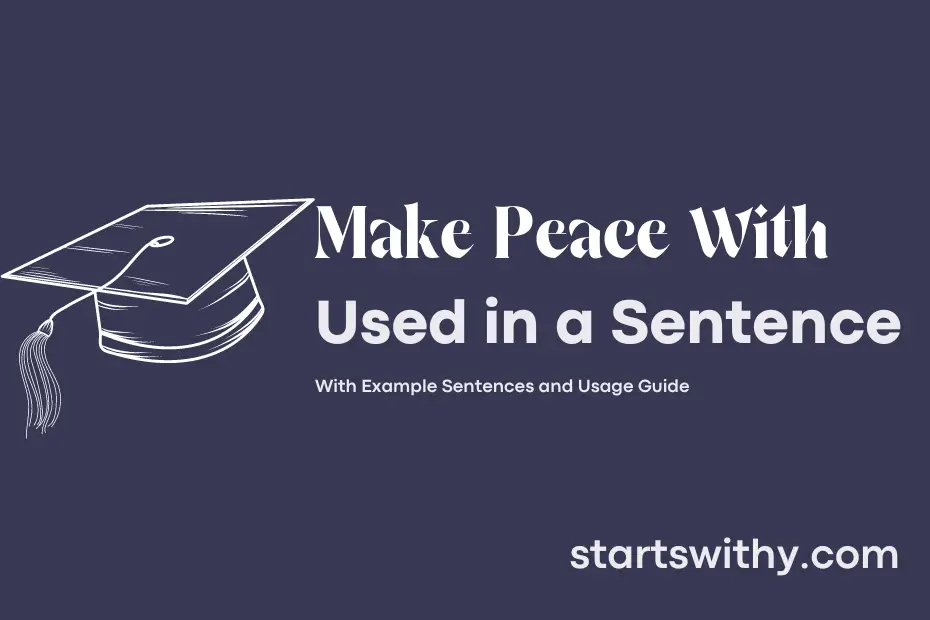Have you ever struggled to forgive someone or let go of a grudge? To “make peace with” someone or something means to reconcile, accept, or come to terms with a conflict or disagreement. It involves finding a sense of closure and releasing negative feelings.
By making peace with situations that have caused us pain or anger, we can free ourselves from the burden of carrying around resentment. It allows us to move forward with a sense of clarity and emotional well-being. The process of making peace with someone or something can lead to personal growth and a greater sense of inner peace.
7 Examples Of Make Peace With Used In a Sentence For Kids
- Make peace with your friends when you have a fight.
- It’s important to make peace with everyone in your family.
- Make peace with the fact that everyone makes mistakes sometimes.
- Remember to make peace with yourself and be kind.
- Let’s make peace with our differences and be friends.
- Make peace with the animals and nature around you.
- Always make peace with others and spread love.
14 Sentences with Make Peace With Examples
- Make peace with the fact that you may not get the top grade in every subject, and instead focus on learning and growing.
- Sometimes, it’s important to make peace with the fact that not everyone will agree with your opinions and that’s okay.
- Make peace with the fact that failure is a part of the learning process and a stepping stone towards success.
- It’s crucial to make peace with the fact that everyone has their own pace of learning and growth.
- Make peace with the idea that asking for help and seeking support is a sign of strength, not weakness.
- As college students, it’s important to make peace with the reality that setbacks and obstacles are part of the journey towards achieving your goals.
- Make peace with the fact that it’s okay to take breaks and prioritize self-care amidst the academic pressure.
- Learning to make peace with your past mistakes and using them as valuable lessons for the future is a key part of personal growth.
- Make peace with the idea that your worth is not determined by your academic achievements or grades.
- It’s crucial to make peace with the fact that change is constant and adapting to new situations is a valuable skill for college students.
- As college students, learning to make peace with uncertainty and embracing the unknown can lead to personal growth and new opportunities.
- Make peace with the fact that comparison to others can be detrimental to your own happiness and success.
- It’s important to make peace with the diversity of opinions and beliefs on campus and engage in respectful dialogue with others.
- Make peace with the fact that not every day will be productive, and that’s okay as long as you keep moving forward.
How To Use Make Peace With in Sentences?
To use Make Peace With in a sentence, you need to follow a few simple steps. First, identify a situation where there is conflict or disagreement. Next, think about how you can come to terms with the situation and find a way to accept it.
For example: “After years of holding on to negative emotions towards her ex-boyfriend, she finally decided to make peace with the situation and move on with her life.”
When using Make Peace With in a sentence, remember that it signifies coming to a place of acceptance and understanding. It implies letting go of any negative feelings or animosity towards a person, situation, or even oneself.
Here are a few more examples to help you get a better idea of how to use Make Peace With:
- “He had to make peace with the fact that he didn’t get the promotion he wanted and focus on improving his skills instead.”
- “She tried to make peace with her past mistakes and forgive herself for her errors.”
- “It was a challenging process, but eventually, they were able to make peace with their differences and work together effectively.”
By incorporating Make Peace With into your sentences, you can convey the idea of letting go of anger, resentment, or any negative emotions, and finding a way to move forward in a positive and constructive manner.
Conclusion
In conclusion, the phrase “make peace with” signifies the act of resolving conflicts, finding reconciliation, or accepting a situation. It encapsulates the idea of moving past differences, bitterness, or misunderstandings to find harmony and understanding. By making peace with others or with oneself, individuals can experience inner peace, mental clarity, and improved relationships.
Whether it’s making peace with past mistakes, forgiving those who have wronged us, or coming to terms with personal struggles, the concept of “making peace with” is essential for personal growth and building healthy connections. By practicing forgiveness, empathy, and understanding, individuals can pave the way for healing, growth, and a more peaceful existence.



